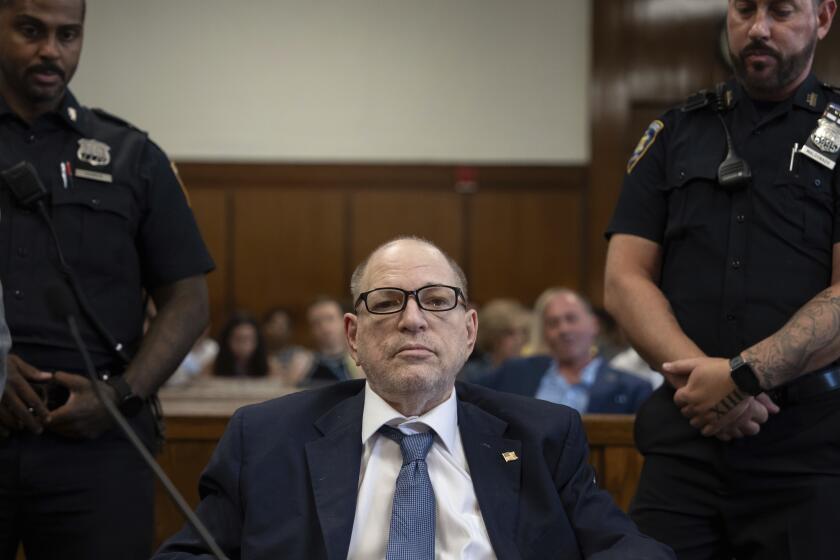Their beautifully curated vintage-book pop-ups were thriving. Along came coronavirus
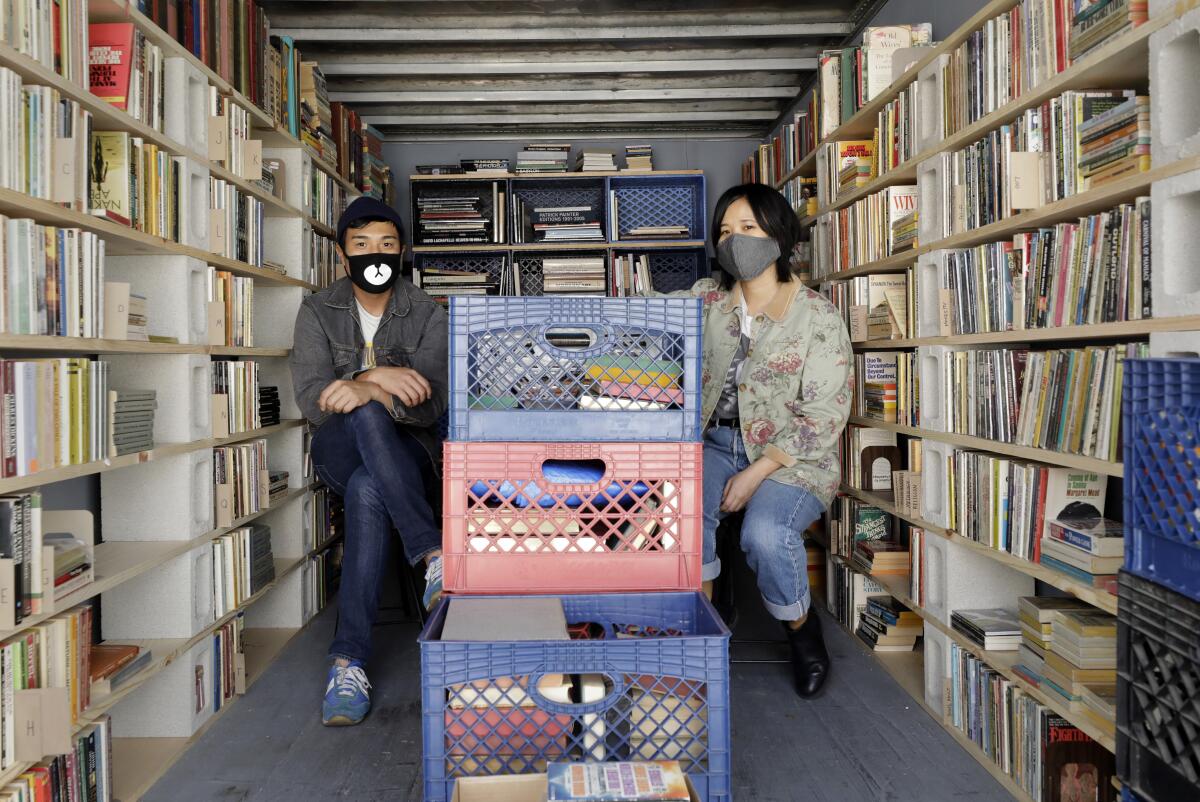
Even before the COVID-19 pandemic became an existential threat to many “nonessential” businesses, running a brick-and-mortar bookstore in L.A. was a precarious occupation. Last year, in a booming economy, bookstore sales across the country declined by 5.7%. In Los Angeles, rising rents were cutting into razor-thin profit margins as much as competition from Amazon. There was, however, at least one bookselling operation that managed to offer a tactile, interpersonal buying experience without paying a dime for retail space. And at the start of 2020, it was on the verge of an expansion that could have helped redefine the book market in Southern California.
Two years ago, A Good Used Book developed a contemporary workaround to the decades-old hurdle of paying for a storefront: recurring pop-ups. Founded by Chris Capizzi and Jenny Yang, a gregarious married couple in their late 30s, the pop-up sells mostly vintage pocket paperbacks at flea markets and other venues. Shopping there feels a little like browsing the book stalls along the Seine in Paris or digging around in a used-record store.
A Good Used Book’s largest layouts could be found at Melrose Trading Post and the Rose Bowl Flea Market. Small, sparsely stocked wooden shelves sit at the front of Capizzi and Yang’s tent while milk crates and wooden boards are carefully arrayed in the back. They house art books, trade paperbacks, hardbacks and some rarities, but pocket paperbacks — the outfit’s biggest sellers and the bulk of its stock — lean cover to cover in small rows of wine crates on several tables. On a recent visit, one crate held a mint 1960s edition of James Baldwin’s “Giovanni’s Room,” another a novelization of the film “Alien.”
“I think the strength that we have is that it’s unexpected,” says Capizzi. “No one has seen books presented in this way.”
Each crate contains about 60 shrink-wrapped paperbacks, bearing stickers noting price, condition and year (or decade) of publication. They cost anywhere from $6 to $40, but the majority are $12 to $20. The condition of each book has been carefully noted, sometimes following a rigorous debate.
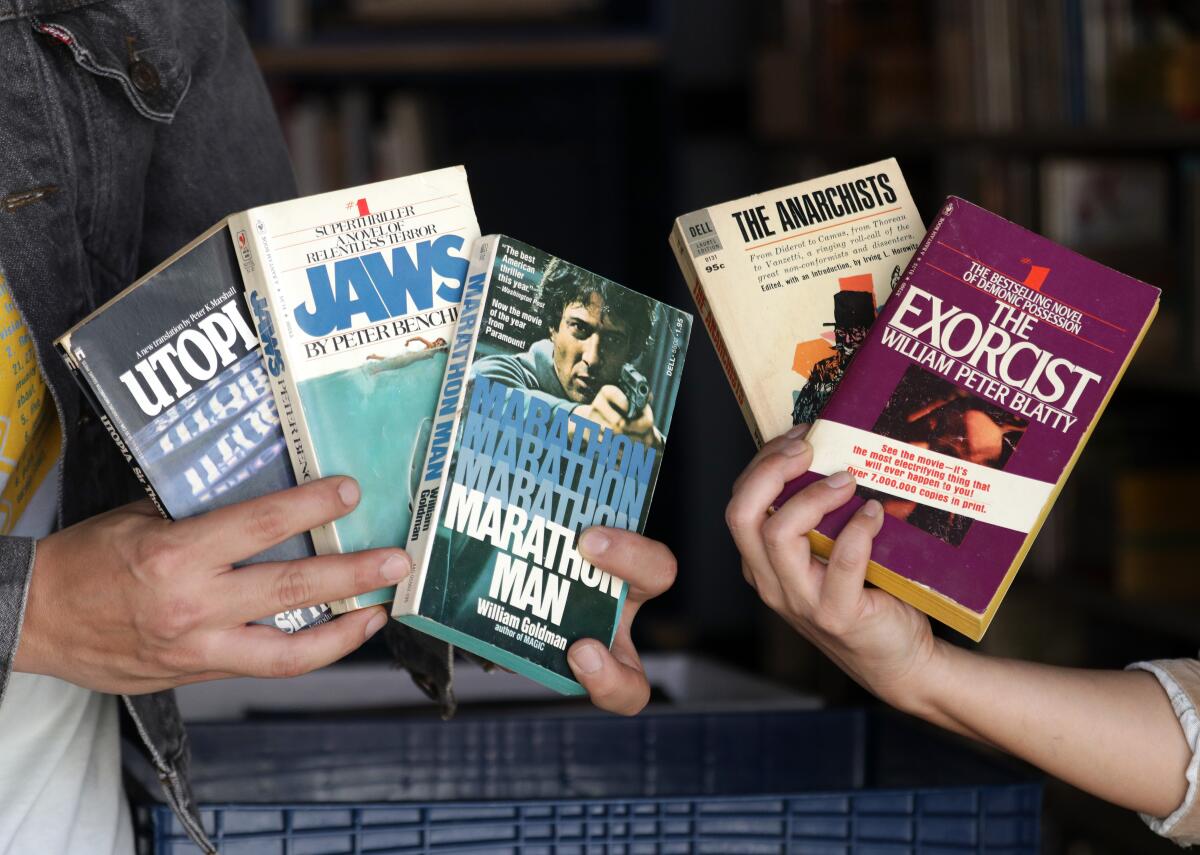
“I don’t want to trick you,” says Capizzi. “The shrink-wrap is totally clear... It does romanticize some of the wear, but we are being as transparent as we can.”
Handmade dividers identify categories including literature, classics, poetry, sci-fi, erotica, psychology and architecture as well as more creative sections like banned books and movie tie-ins. Most bookstores have their curatorial predilections (and prejudices), but A Good Used Book treats books in each section with the same reverence. The extra room in every crate is intentional; it makes flipping among books easy.
“People compulsively flip,” Capizzi says. “When you flip to the next book, it’s revealing another cover. It promotes you to do it again. You get rewarded.” There is no digital equivalent for that reward. Amazon can create new algorithms, but it can’t replicate the joys of browsing.
While A Good Used Book wouldn’t succeed without its stock, its presentation draws in the otherwise book-wary. The informative packaging and the size of the couple’s pop-ups make book buying more approachable, which means they can grab customers that brick-and-mortar shops might miss. You don’t have to know George Orwell from Frank Herbert or Toni Morrison from Ursula K. Le Guin. You can judge every book by its cover and move on.
“There are a lot of customers who will say, ‘I don’t read,’ or, ‘I haven’t read,’” Yang says. “But then there are people who don’t read that do find something really strange or something that’s for them and they get really excited about it.”
A Good Used Book captures that enthusiasm on Instagram, where its owners post photos of smiling pop-up patrons. They ask every customer to pose for one picture, and most are happy to oblige. It’s a canny marketing move in a performative world where physical objects are fetishized, but hardly a cynical one. “We physically meet our 20 followers that we get each week in person,” Capizzi says. “I don’t know how many people are doing it that way.”
Before COVID-19 closures, the outfit also worked because it had no competition. Wherever and whenever the owners did a pop-up, they were the lone bookseller. That didn’t make it easy, though. The grind of preparing and breaking down weekly pop-ups is ceaseless and physically taxing.
Several days a week, Capizzi and Yang work out of their tiny K-town studio apartment. Surrounded by several thousand books and two cats rescued from their alleyway, they clean hundreds of books a day with alcohol and scraps of old T-shirts before shrink-wrapping them by hand. If they’re not at home, they’re traveling to estate sales and book dealers as far as Palm Springs. And if they’re not sourcing books, they’re at their U-Haul storage sheds in Atwater Village from dawn till dusk. They call it “base camp.”
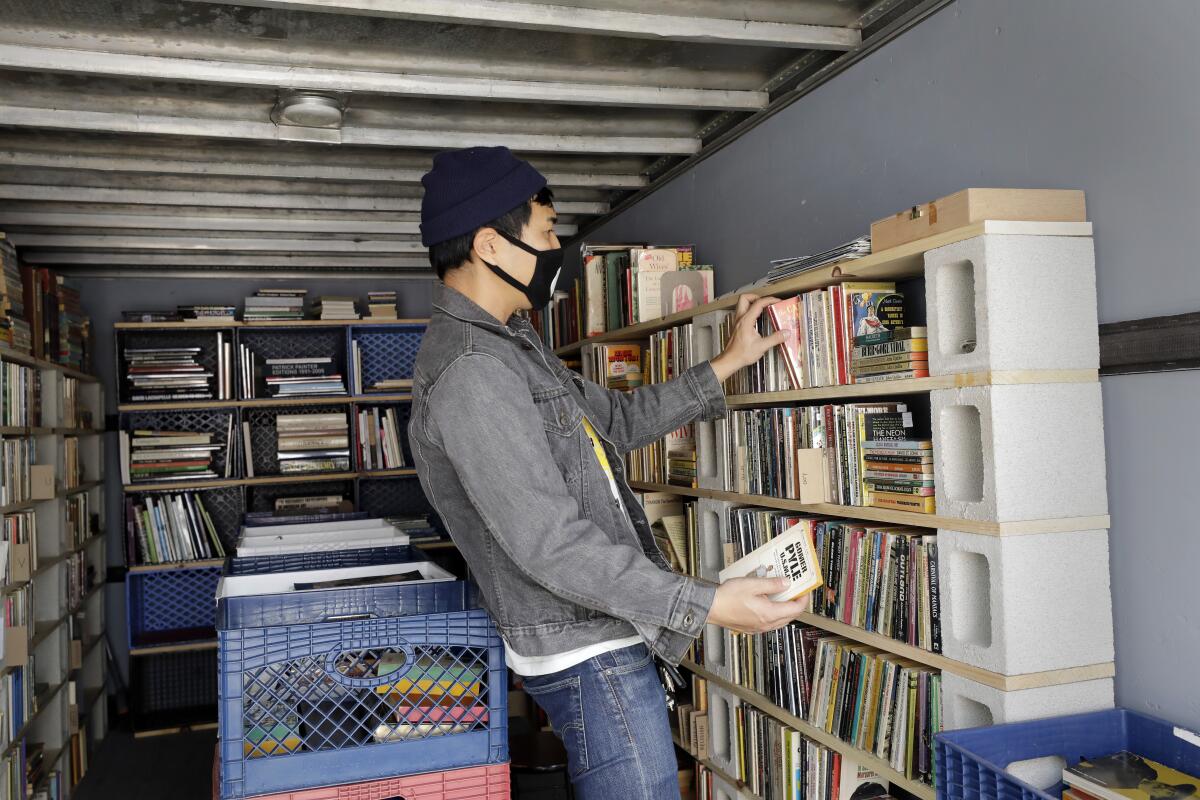
We meet there in early March, days before all nonessential businesses close their doors indefinitely. Capizzi and Yang are joined by Sarah Bofenkamp, a recent L.A. transplant who met them at one of the dollar book fairs the couple held in Frogtown before losing their studio space. Her duties include writing Instagram captions, cleaning books and pulling replacements for books sold. Bofenkamp recently got a full-time job elsewhere, but she still works at base camp once a week and helps the couple sell at pop-ups. (Since COVID-19, she’s moved back to Iowa and helps remotely.)
Tucked in the back corner of the U-Haul parking lot, the two sheds of base camp are themselves like low-ceilinged bookstores. All the books are shelved, alphabetized and categorized or put in milk crates for cleaning and wrapping. Many bookstores have a surfeit of mid- to low-level stock, but A Good Used Book has high standards for even its cheapest books. The bookseller also tracks its bestsellers and stocks up. There are, for instance, lots of copies of “The Catcher in the Rye.”
At the end of each week, Capizzi and Yang pack their weekend stock of approximately 1,600 books in a rickety but reliable ’99 Chevy Astro van. The Astro’s interior is Capizzi’s masterclass in spatial geometry, a game of Tetris only he knows how to beat. When you load and unload it as frequently as they do, you need to minimize the mental anguish and offset the physical toll.
“My back was killing me [at first]. I was not used to the pain,” Capizzi says. “After a year, I kind of got used to it.”
---
Capizzi and Yang were born to run a small business. They met in Maryland, where both grew up helping out in family businesses. Yang’s parents ran a liquor store for three decades in Baltimore, and Capizzi’s parents owned a truck stop in Bowie. The main inspiration for A Good Used Book’s current setup is Memory Lane Music, the record store Capizzi’s family ran until digital music drove it out of business.
When Capizzi and Yang struck out on their own, they had trouble finding their niche. Capizzi studied narrative film and Yang majored in photojournalism. Yang worked freelance photography gigs while Capizzi tried to make short films when he wasn’t working for a public access TV station. They decided to get married and considered buying a condo; instead, they spent their savings traveling through the South for eight months. When they rolled into Koreatown in 2013, they rented the same apartment they’re in today with the little money they had left.
Yang got a job in customer service and Capizzi went to work for a below-the-line talent agency. They were closer to finding stability but still felt unfulfilled. Ironically, the seed for A Good Used Book — their livelihood and their passion — grew out of a collaboration with Amazon.
“[Jenny] sent me a link about fulfillment by Amazon, where resellers buy stuff and send it into the warehouse and Amazon fulfills it as Amazon Prime,” says Capizzi. “So we buy a couple books, send them into Amazon expecting nothing, and they sell. We’re like, ‘OK.’”
At thrift stores and estate sales, they sourced books and developed relationships with other sellers doing the same. Though they’d never been major readers, the couple gradually developed personal reading lists from their buying and an appreciation for writers they’d never read before. After a year of increasing online sales, however, Capizzi and Yang realized that the Amazon market was limited.
“There were so many art books or even paperbacks that you just can’t sell [on Amazon],” Yang says. “[Other Amazon sellers] were just throwing them away every single day.”
They did their first pop-up at Melrose Trading Post in 2018, focusing initially on cookbooks and kids books, neither of which sold well. After months of trial and error, failed pop-ups at Westside markets and jewelry stores, they figured out the most lucrative locations and books — pocket paperbacks, invariably their bestsellers.
“There were a lot of great books that we had in trade [paperback] or hardcover and people would say, ‘Oh, I read that when I was in middle school,’” Yang says, signaling indifference. “When we had the same book in a vintage paperback, people would be like, ‘Wow! I read this when I was in middle school!’”
Today, pocket paperbacks make up roughly 80% to 85% of their stock. Customers have complained that A Good Used Book’s prices are too high in comparison to brick-and-mortar stores (never mind cut-rate Amazon). But curation costs money.
“Some people feel like books, especially vintage books, have no value,” Yang says. “But we believe that they do … We think they’re beautiful and interesting and important to save.”
Until mid-March, A Good Used Book was on track to incorporate and expand. Yang and Capizzi had guaranteed vending locations at three markets as well as at Verve Coffee downtown and were considering purchasing another van to tackle more markets and restarting their dollar book fairs. Despite their success, though, transitioning to a physical store never came up. Their model was working for them.
“We’re not here to replace the old bookstores,” Capizzi says. “I want all of us to do better.”
COVID-19 has severely hurt the business of every bookseller in L.A. and around the world. Online sales and gift cards, curbside pickups and home deliveries, GoFundMe campaigns — for now, each bookstore has its life support measures. A Good Used Book, like its physical kin, has adapted as best it can, leaning on its Instagram presence to sell books there almost exclusively. (You can find some of its stock on DePop as well.)
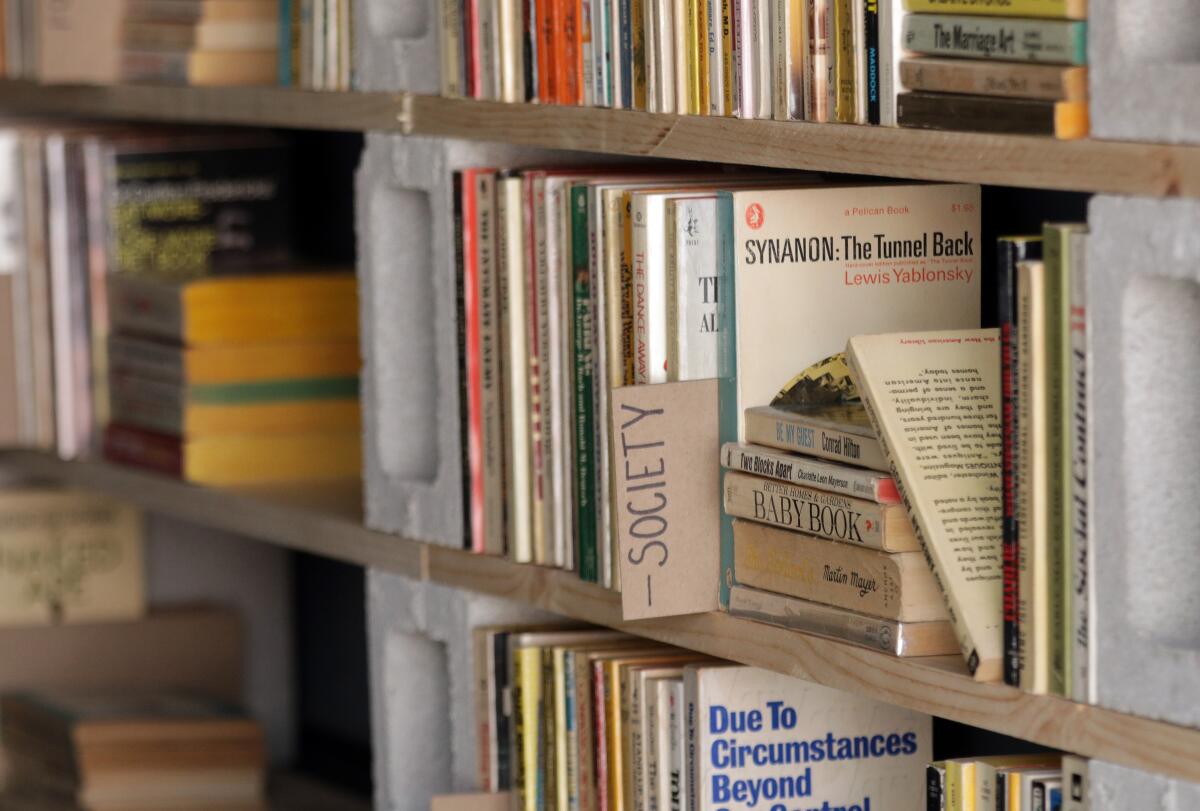
To keep up the rhythm of its pop-ups, A Good Used Book sells at noon on Wednesdays, Saturdays and Sundays. Each book is posted to its Instagram story with its price, condition, publication date and category noted in bubble captions. It’s not the same as flipping through wine crates, but close enough in this new world.
Fortunately, sales have been good, and Yang and Capizzi have several months’ worth of stock. The vendor is mailing to every ZIP Code and delivering locally. But the sellers are generating only 20% to 30% of their usual revenue. With their business paperwork in flux, they also don’t qualify for much of the aid offered through a recent government stimulus package. Like indie bookstores and small businesses everywhere, A Good Used Book is crushed by the lack of government support, the lack of empathy from landlords and banks. In spite of it all, Yang and Capizzi are pushing ahead, thankful for the followers they’ve met in person who are now supporting them online, hoping that A Good Used Book will be around after this plague passes, there to greet them at the next pop-up.
“It’s an honor to have the means to continue even in this capacity,” says Capizzi. “We’re luckier than most, even if it doesn’t feel that way. We’ll do it as long as we can, until the very end.”
Bell is a journalist and writer from Santa Monica.
More to Read
Sign up for our Book Club newsletter
Get the latest news, events and more from the Los Angeles Times Book Club, and help us get L.A. reading and talking.
You may occasionally receive promotional content from the Los Angeles Times.
